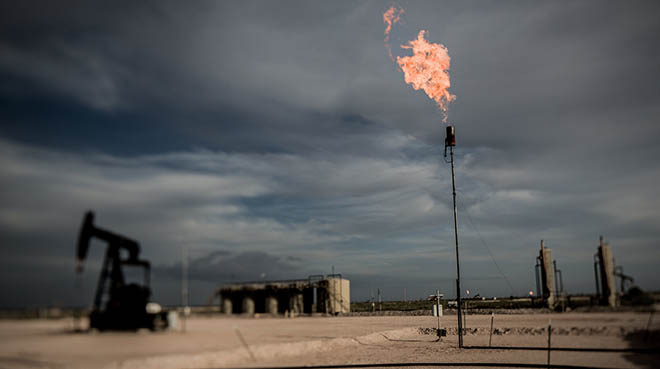S&P Global Offerings
Featured Topics
Featured Products
Events
S&P Global Offerings
Featured Topics
Featured Products
Events
S&P Global Offerings
Featured Topics
Featured Products
Events
Banking & Capital Markets
Economy & Finance
Energy Transition & Sustainability
Technology & Innovation
Podcasts & Newsletters
Banking & Capital Markets
Economy & Finance
Energy Transition & Sustainability
Technology & Innovation
Podcasts & Newsletters
S&P Global Offerings
Featured Topics
Featured Products
Events
29 Nov, 2022
By Karin Rives

|
Excess natural gas is burned, or flared, from an oil well. A proposed rule would reduce but not fully eliminate emissions from this practice. |
The Biden administration has proposed what it described as "reasonable steps" for oil and natural gas producers to reduce methane pollution from lease sites on tribal and public lands, requiring operators to compensate mineral owners for wasted natural gas.
The proposed rule would require operators to put in place leak detection and waste reduction plans. It also sets a monthly limit on how much they can flare before having to pay royalties on wasted gas, without requiring a total ban on routine flares.
Environmental groups called it "an important first step," but they warned the rule would not go far enough to curb waste and climate-warming methane pollution from U.S. production fields. Methane is a greenhouse gas more than 80 times more powerful than carbon dioxide in the short term. Today it accounts for about 30% of the rise in global temperatures, according to the International Energy Agency.
The proposed rule announced Nov. 28 would roll back a 2018 Trump administration decision that, in turn, rescinded a 2016 Obama-era rule that sought to rein in natural gas emissions on land controlled by Native American tribes or the federal government. The measures have been litigated by the oil industry and environmental groups since 2016, with courts reaching different and sometimes conflicting outcomes.
Proposal impacts, provisions
The U.S. Interior Department estimated the new rule would generate nearly $40 million in additional annual royalties, paid to tribes and the federal government, on natural gas that would no longer leak or be vented or flared. In all, benefits to society from reduced methane leaks would be $427 million annually compared to $122 million per year in costs for operators between 2022 and 2031, the agency estimated.
Even so, the proposal from the agency's Bureau of Land Management, or BLM, aims to avoid further legal challenges or contradiction by the courts. The proposed rule would narrow some requirements under the 2016 rule and include a disclaimer for the agency's social cost of carbon estimates, noting that a federal court ruling in Wyoming in 2020 threw out federal methane regulations on public lands.
"The BLM is expressly excluding the social cost of greenhouse gases from the considerations underpinning any of the proposed waste prevention requirements, thereby addressing the Wyoming court's concern that the 2016 rule was inappropriately supported by 'climate change benefits,'" the proposal said.
Instead, the agency said, the goal of the rule is to promote the conservation of natural gas, a public resource.
Industry, environmental advocates will weigh in
The industry's leading trade group said it supports regulations consistent with the government's authority to "require the economic capture" of greenhouse gases.
"We will work with BLM in support of a final rule that is cost-effective and furthers the progress we continue to make on reducing emissions," Cole Ramsey, the American Petroleum Institute's vice president of upstream policy, said in a statement.
Environmental groups said the proposed waste prevention requirements should be strengthened to meet those in Colorado and New Mexico, which require operators to eliminate routine venting of natural gas.
"It's the sort of flaring that you see in the Permian and in the Bakken [oil fields in Texas and North Dakota], where day after day, week after week, gas from oil wells is just being burned off," Jon Goldstein, the Environmental Defense Fund's senior director for of regulatory and legislative affairs, said in an interview. "The Biden administration is rightfully trying to do everything it can to help our European allies get off Russian natural gas, so it's just unconscionable that we are burning off this resource to no one's benefit here at home."
The group is among those expected to push for stronger restrictions for operators during the proposed rule's 60-day comment period.
Meanwhile, federal officials said the proposal struck the right balance.
"No one likes to waste natural resources from our public lands," BLM Director Tracy Stone-Manning said in a press release. "This draft rule is a common-sense, environmentally responsible solution as we address the damage that wasted natural gas causes. It puts the American taxpayer first and ensures producers pay appropriate royalties."
Between 2010 and 2020, 44.2 billion cubic feet of methane was vented annually from federal and tribal onshore leases, more than four times more than the annual amount during the previous 10 years, the BLM said.
S&P Global Commodity Insights produces content for distribution on S&P Capital IQ Pro.
